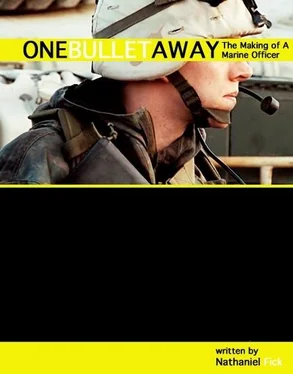Gunny Wynn kept his job, and I kept mine.
On a Friday afternoon in May, I gathered the platoon at the center of the carport. I had been working on a secret project for the previous week — wrangling permission from the division for a visit to the ancient city of Babylon. Colonel Ferrando pressed hard on our behalf, and almost unbelievably, it was granted. After major combat ended, the First Marine Expeditionary Force moved its headquarters to one of Saddam’s palaces near the town of Hillah, seventy miles north of Ad Diwaniyah. The palace overlooked Babylon’s ruins. Part of my desire came from studying the classics in college. I had tramped through crumbling cities in Greece, Italy, Spain, and North Africa. But nothing compared to joining the handful of Westerners who, in the past thirty years, had visited one of the ancient world’s greatest cities. Part of it, too, was the welcome change of pace for the Marines and a chance to go home with memories of something truly good. Seeing Babylon was a way to get out from behind the gun sight.
We left Paige at seven o’clock the next morning. Iraqi vendors lined both sides of the road, hawking beer, AK bayonets, Arab porn, and crude Iraqi flags of painted canvas. We disciplined ourselves to stop only for two coolers filled with sodas and a bunch of ripe bananas. Turning north on Highway 1, the platoon accelerated. Army supply convoys lumbered along in the slow lane as we flashed past on their left. Hikers in San Diego joke about not needing to outrun mountain lions; they only have to outrun other hikers. The same principle applied on Iraq’s highways. For a month or two, though, the roads were mostly safe. The war had ended, and the insurgency hadn’t yet begun. Still, when I briefed the Marines about the trip, I acknowledged that some of them might think it foolish to take the risk of going sightseeing. Anyone who preferred not to come was free to stay at Paige. They all chose Babylon.
The exit toward Hillah led us through miles and miles of palm groves. Holes in the frond canopy marked where American planes had blasted Iraqi tanks. Fresh growth would soon cover the blackened patches of earth, and maybe someday tourists would poke at the rusting hulks as they do in the South Pacific and Normandy. Closer to Babylon, we noticed changes in the modest homes along the road. A stainless steel Sub-Zero refrigerator dominated the front yard of a one-room mud hut. Slabs of pink marble and two ornate wardrobes stood near another. A decrepit Datsun pickup truck held a crystal chandelier. It looked as though a palace had been looted.
We rounded a bend in the dirt road and saw a building like a science-fiction fantasy atop the only hill for miles around. Part fortress and part castle, it tapered as it climbed, squat but ornate. It shone in the sunlight, punctuated by gaping black windows. That first view of a presidential palace conjured up all the dark mysteries of Saddam’s Iraq. Dinner parties with lines of black limousines, sparkling lights and music reaching out across the palm groves. I imagined hammered brass trays piled with steaming meat and vegetables, cavernous baths, and a harem. I thought also of forced labor, torture, and executions. The building exuded a bit of each of these things. An American flag hung in the highest window.
Ancient Babylon spread across the plains beneath the palace. The city had been excavated by Germans a century earlier and its treasures carted off to Berlin. Most of what remained was, like the palace, a fantasy. Saddam had reconstructed Babylon not according to any archaeological evidence, but to tickle his own fancy. Crenellated walls and soaring towers crowned the bricks of the original ruins. Once each year, the regime had held a ceremony in Babylon to celebrate Iraq’s glory. Saddam himself had played the role of King Nebuchadnezzar.
We parked next to the famed Ishtar Gate, a blue portal covered with reliefs of lions, stags, and mythical creatures. I remembered only the highlights of Babylon’s history — Hammurabi, the Hanging Gardens, the death of Alexander the Great — and was relieved when a distinguished older gentleman approached us. His first sentence made me laugh: “Call me Ishmael.” Wearing a fedora and dark sunglasses, Ishmael had been an archaeologist at Babylon before the Ba’ath Party came to power in 1968. He carried a thick binder filled with maps and photographs and offered to take us on a tour of the site.
Ishmael shepherded us through Babylon’s cobbled streets. He spoke lilting English, weaving a story of mighty kings and fallen empires. Behind him, like so many schoolkids on a field trip, trailed the platoon, covered with guns and knives, straining to hear every word. We walked down the fabled Street of Processions, past the basalt Lion of Babylon, and across the stage on which Alexander is rumored to have died. Colbert slid next to me and marveled that, in only two years, we had followed two of Alexander’s most fabled campaigns — across Afghanistan and Iraq.
“Somehow I doubt I’ll be remembered as ‘Brad the Great,’” he said.
Ishmael mixed his history lesson with modern parallels: new beginnings, imperial hubris, the death of an old regime. He kept up a running commentary on Saddam’s abuses. Six of his family members, including his only son, had been executed in the 1990s. Inside the mysteriously cool natural icehouses deep beneath the floors, he quietly expressed his hope that the Americans would kill Saddam and end his terror definitively. The fear still gripped him.
Back outside, Espera stood against a wall, with the sunlight casting sharp shadows across a stone courtyard. “Look around. This great empire rose and fell. Everything rises and falls, nations and individuals, too,” he said. Lacking a cigar to point with, he leaned back on his hands. “Sometimes I think these decisions are already made; the script is already written, and we’re the last to read it. Maybe the universe is like a big watch: If you can crack the formula to the universal principles, then you can figure it all out.”
Colbert cut in. “Is this your goddamn lottery theory again?”
Espera ignored the exasperation and bent toward me. “Think about the lottery for a second,” he continued. “You buy some tickets at 7-Eleven, and you turn on the TV that night to watch some dude read numbers off Ping-Pong balls. Well, there’s nothing random about which numbers pop up.” Espera said this as if it were all self-evident. Then he narrowed his eyes and got to the point. “If you could calculate the weight of the balls, the temperature and humidity of the room, the force of the little air jets, and a thousand other variables, then you could correctly predict what numbers win.” He looked around with satisfaction. “Same thing here. Babylon fell. Iraq fell. The United States will someday fall. It’s already written. That bullet that hit Pappy had his name on it since it was iron ore in the ground. We just couldn’t see and calculate all the variables in time to save him. I’m not sure if that makes me feel better or worse.”
A small crowd had gathered. Ishmael looked uncertainly at his competition. Reyes clapped Espera on the back and said, “Don’t know if I agree with you, brother, but well said. Amen.”
Colbert wandered off, saying, “Tony, you need to go home and get laid.”
“Tell me something I don’t know, white boy.” Espera fell back into his own brooding, and we followed Ishmael toward the Ishtar Gate.
He carefully gathered his maps, tucking them back into the binder. Ishmael shook each of our hands, saying he hoped that Western tourists would soon flock to Babylon and help his people recapture their lost prosperity. Removing his fedora, Ishmael insisted that we didn’t have to pay him but allowed that any money “would buy many things of need” for his family. Gunny Wynn was a step ahead. He had collected a few dollars from each of us and tipped Ishmael a year’s wages.
Читать дальше












